Welcome to the Amira-Avizo Software Use Case Gallery
Below you will find a collection of use cases of our 3D data visualization and analysis software. These use cases include scientific publications, articles, papers, posters, presentations or even videos that show how Amira-Avizo Software is used to address various scientific and industrial research topics.
Use the Domain selector to filter by main application area, and use the Search box to enter keywords related to specific topics you are interested in.

Architecture of the chikungunya virus replication organelle
Alphaviruses are mosquito-borne viruses that cause serious disease in humans and other mammals. Along with its mosquito vector, the Alphavirus chikungunya virus (CHIKV) has spread explosively in the last 20 years, and there is no approved treatment for chikungunya fever. On the plasma membrane of the infected cell, CHIKV generates dedicated organelles for viral RNA replication, so-called spherules. Whereas structures exist for several viral proteins that make up the spherule, ... Read more
Timothée Laurent, Pravin Kumar, Susanne Liese, Farnaz Zare, Mattias Jonasson, Andreas Carlson, Lars-Anders Carlson.
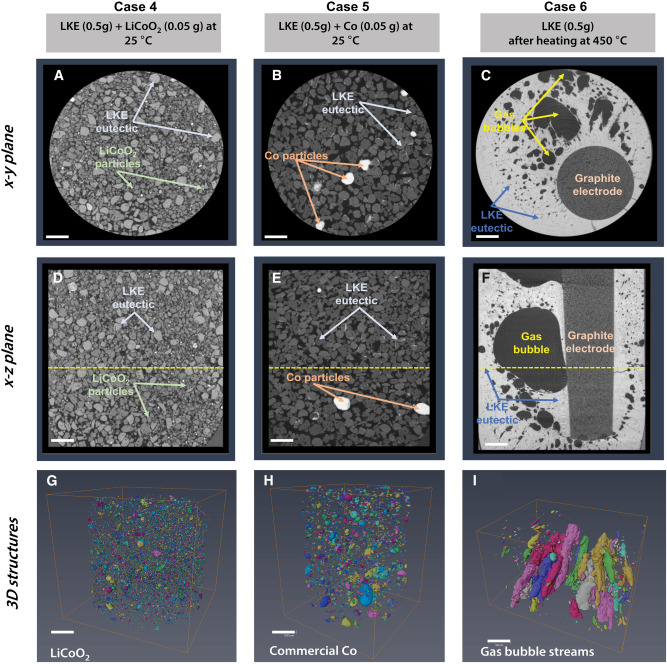
Recycling spent lithium-ion batteries (LiBs) guarantees the conservation of important metal resources by reducing demands on raw supply and offsetting the energy and environmental costs associated with its manufacture. Employing a molten salt as a solvent for extraction affords a much greener and simpler route to metal recovery by electrochemical means. The current mechanistic understanding of the electrochemical recovery of metals in molten salts needs to be improved for the process to be op... Read more
Mateen Mirza, Wenjia Du, Lara Rasha, Steven Wilcock, Arfon H. Jones, Paul R. Shearing, Dan J.L. Brett
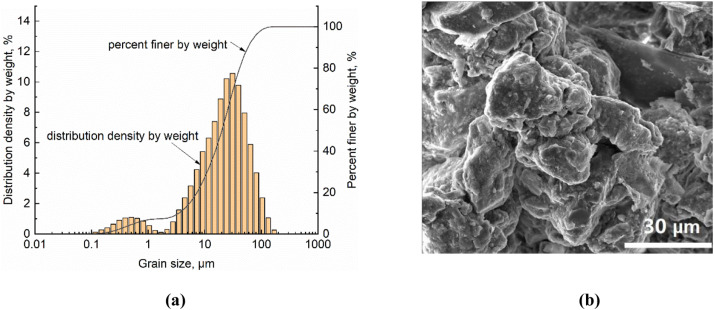
3D characterisation of the particle kinematics during loess collapse is performed based on X-ray micro-computed tomography.
Particle displacements and rotations associated with the collapse are determined.
The volumetric strain is shown to be significantly heterogeneous at single-particle scale.
The evolution of particle-to-particle contacts is found to be much more complex than previously stated.
An apparatus is specially designed to perf... Read more
B. Yu, W. Fan, J.H. Fan, T.A. Dijkstra, Y.N. Wei, T.T. Wei
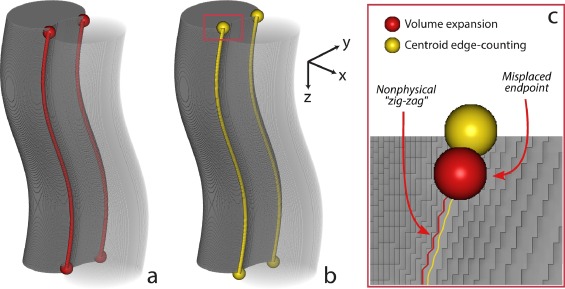
Improving microstructural quantification in FIB/SEM nanotomography
Advanced nanotomographic analysis is still far from routine, and a number of challenges remain in data acquisition and post-processing. In this work, we present a number of techniques to improve the quality of the acquired data, together with easy-to-implement methods to obtain “advanced” microstructural quantifications. The techniques are applied to a solid oxide fuel cell cathode of interest to the electrochemistry community, but the methodologies are easily adaptable to a wide range of... Read more
Joshua A.Taillon, Christopher Pellegrinelli, Yi-Lin Huang, Eric D.Wachsman, Lourdes G. Salamanca-Riba
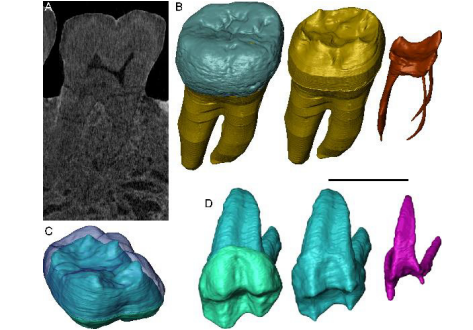
Exploring hominin and non-hominin primate dental fossil remains with neutron microtomography
Fossil dental remains are an archive of unique information for paleobiological studies. Computed microtomography based on Xray microfocus sources (X-µCT) and Synchrotron Radiation (SR-µCT) allow subtle quantification at the micron and sub-micron scale of the meso- and microstructural signature imprinted in the mineralized tissues, such as enamel and dentine, through highresolution “virtual histology”. Nonetheless, depending on the degree of alterations undergone during fossiliza... Read more
Clément Zanolli, Laboratory AMIS, UMR 5288, University of Toulouse III - Paul Sabatier, France, and al.
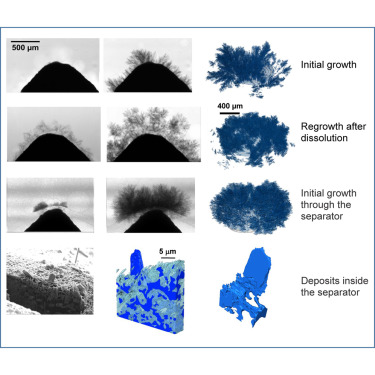
Alternative battery technologies are required to meet growing energy demands and address the limitations of present technologies. As such, it is necessary to look beyond lithium-ion batteries. Zinc batteries enable high power density while being sourced from ubiquitous and cost-effective materials. This paper presents, for the first time known to the authors, multi-length scale tomography studies of failure mechanisms in zinc batteries with and without commercial microporous separators. In bo... Read more
Vladimir Yufit, Farid Tariq David S. Eastwood Moshiel Biton Billy Wu Peter D. Lee Nigel P. Brandon
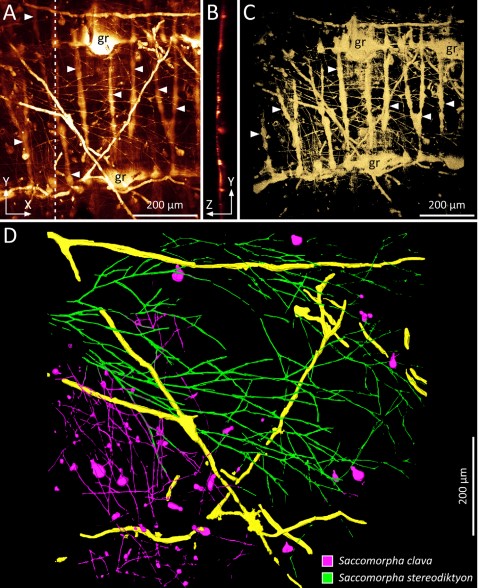
Microscopic organisms that penetrate calcareous structures by actively dissolving the carbonate matrix, namely microendoliths, have an important influence on the breakdown of marine carbonates.
Microscopic organisms that penetrate calcareous structures by actively dissolving the carbonate matrix, namely microendoliths, have an important influence on the breakdown of marine carbonates. The study of these microorganisms and the bioerosion traces they produce is crucial for understanding ... Read more
Philipp-Konrad Schätzle, Max Wisshak, Andreas Bick, André Freiwald, Alexander Kieneke
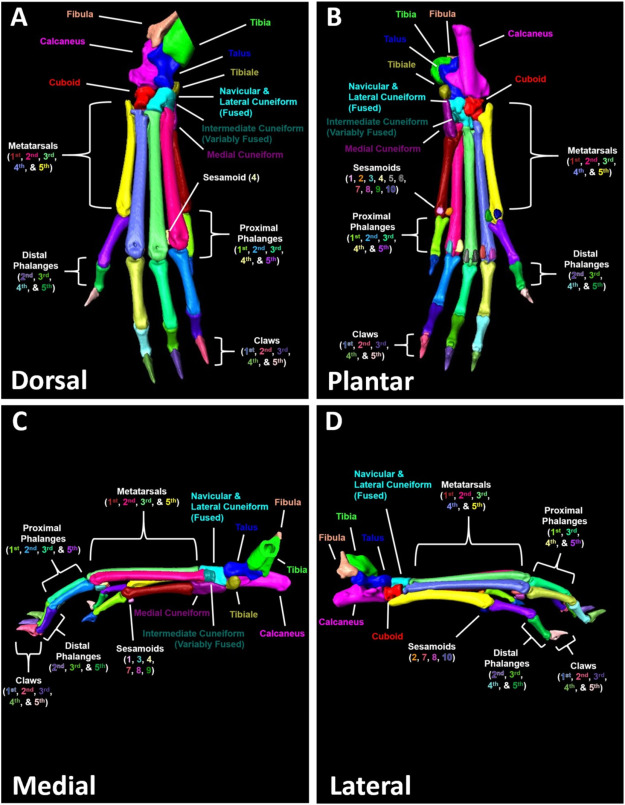
A high-throughput semi-automated bone segmentation workflow for murine hindpaw Micro-CT datasets
Micro-computed tomography (μCT) is a valuable imaging modality for longitudinal quantification of bone volumes to identify disease or treatment effects for a broad range of conditions that affect bone health. Complex structures, such as the hindpaw with up to 31 distinct bones in mice, have considerable analytic potential, but quantification is often limited to a single bone volume metric due to the intensive effort of manual segmentation. Herein, we introduce a high-throughput, user-friendl... Read more
H. Mark Kenney, Yue Peng, Kiana L.Chen, Raquel Ajalik, Lindsay Schnur, Ronald W.Wood, Edward M.Schwarz, Hani A. Awad
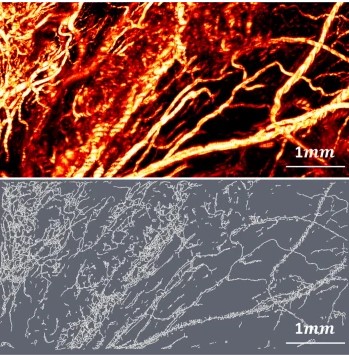
Optical Resolution Photoacoustic Microscopy of Ovary and Fallopian Tube
Ovarian cancer is the leading cause of death among gynecological cancers, but is poorly amenable to preoperative diagnosis. In this study, we investigate the feasibility of “optical biopsy,” using high-optical-resolution photoacoustic microscopy (OR-PAM) to quantify the microvasculature of ovarian and fallopian tube tissue. The technique is demonstrated using excised human ovary and fallopian tube specimens imaged immediately after surgery.
This report describes the first applicatio... Read more
Bin Rao, Xiandong Leng, Yifeng Zeng, Yixiao Lin, Ruimin Chen, Qifa Zhou, Andrea R. Hagemann, Lindsay M. Kuroki, Carolyn K. McCourt, David G. Mutch, Matthew A. Powell, Ian S. Hagemann & Quing Zhu
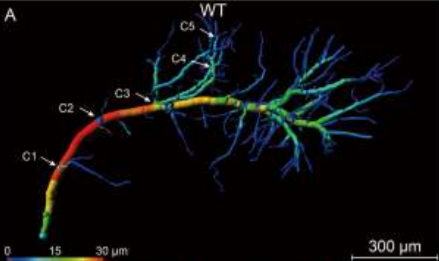
Accumulating evidence indicates the critical importance of cerebrovascular dysfunction in the pathogenesis of Alzheimer’s disease (AD). However, systematic comparative studies on the precise brain vasculature of wild-type and AD model mice are still rare. Using an image optimization method for analyzing Micro-Optical Sectioning Tomography (MOST) data, we generated cross-scale whole-brain 3D atlases that cover the entire vascular system from large vessels down to smallest capillaries at ... Read more
Xiaochuan Zhang, Xianzhen Yin, Jingjing Zhang, Anan Li, Hui Gong, Qingming Luo, Haiyan Zhang, Zhaobing Gao, Hualiang Jiang
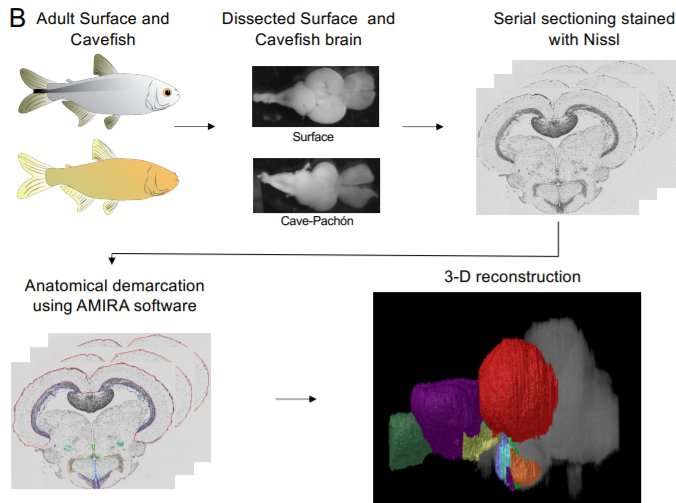
A shift in environmental conditions impacts the evolution of complex developmental and behavioral traits. The Mexican cavefish, Astyanax mexicanus, is a powerful model for examining the evolution of development, physiology, and behavior because multiple cavefish populations can be compared to an extant and ancestral-like surface population of the same species. Many behaviors have diverged in cave populations of A. mexicanus, and previous studies have shown that cavefish ha... Read more
Cody Loomis, View ORCID ProfileRobert Peuß, James Jaggard, Yongfu Wang, Sean McKinney, Stephen Raftopoulos, Austin Raftopoulos, Daniel Whu, Matthew Green, Suzanne E. McGaugh, Nicolas Rohner, Alex C. Keene, Erik R. Duboue
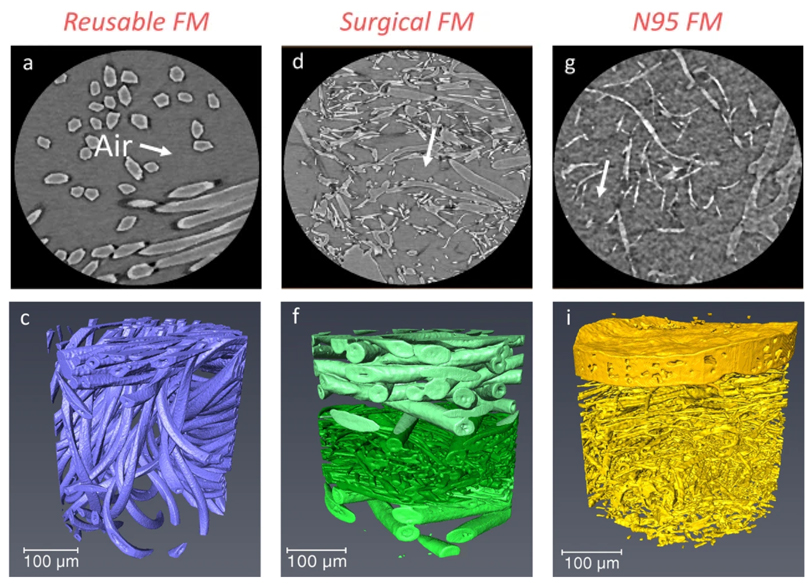
Microstructure analysis and image-based modelling of face masks for COVID-19 virus protection
Until March 2021, around 120 million coronavirus disease (COVID-19) infected cases and over 2.6 million deaths have been reported worldwide. […] Recent investigations have implied that face masks help to reduce the disease transmission and therefore slow down the growth of the epidemic curve. However, there are still ongoing debates on the efficacy of wearing masks […] since there is a general lack of information relating to the material structure of commonly used face masks.Read more
Wenjia Du, Francesco Iacoviello, Tacson Fernandez, Rui Loureiro, Daniel J. L. Brett & Paul R. Shearing
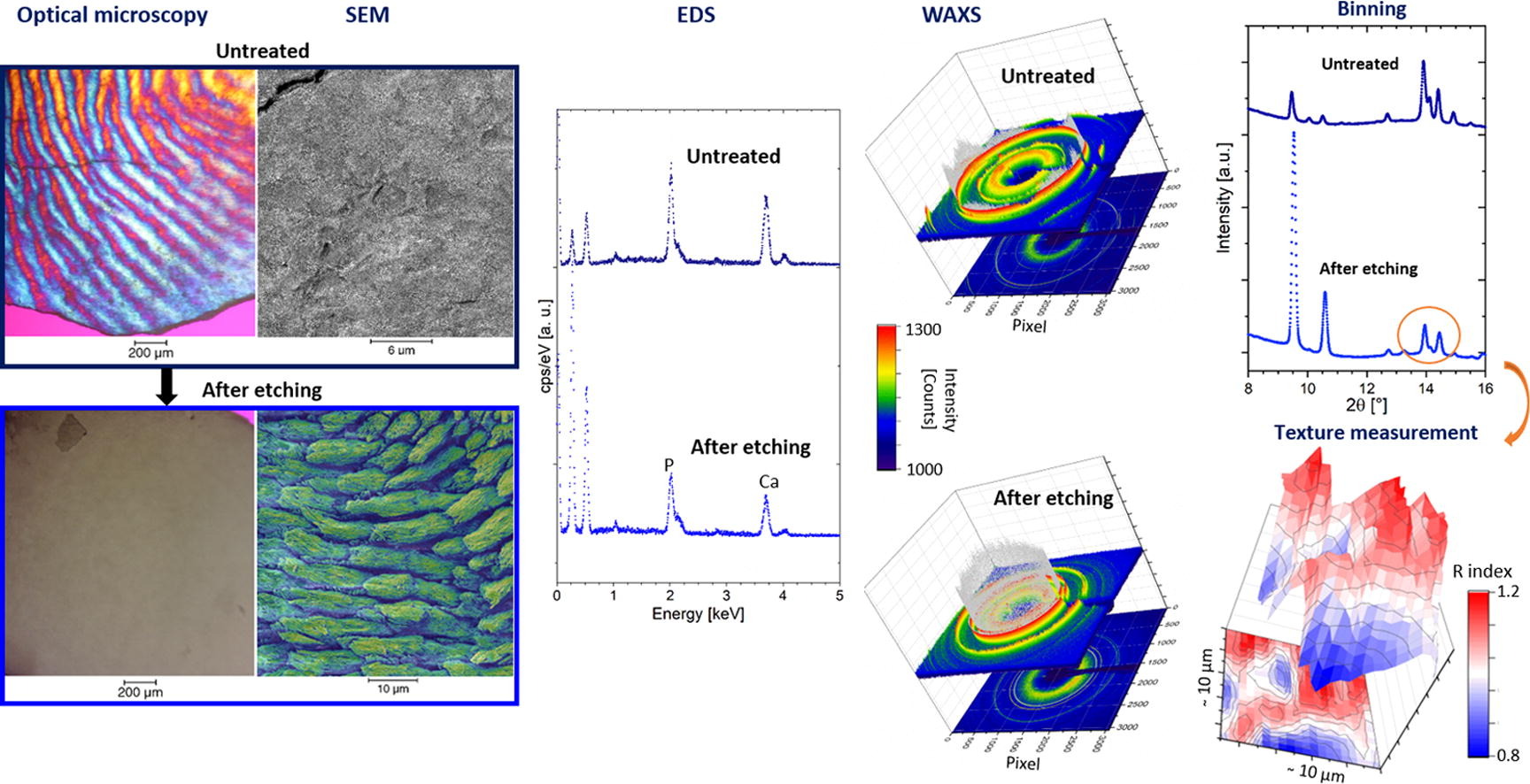
Enamel caries is a highly prevalent worldwide disease that involves the demineralisation of the outer tooth structure. In this study, we report the analysis of artificially demineralised human enamel sections (‘slices’) etched using lactic acid (2% v/v) in comparison with healthy enamel using correlative techniques of optical and electron microscopy, as well as scanning diffraction. Demineralisation of the enamel was characterised at the micron to sub-micron scale. The structure of the he... Read more
Cyril Besnard, Robert A. Harper, Thomas E. J. Moxham, Jonathan D. James, Malte Storm, Enrico Salvati, Gabriel Landini, Richard M. Shelton, Alexander M.Korsunsky
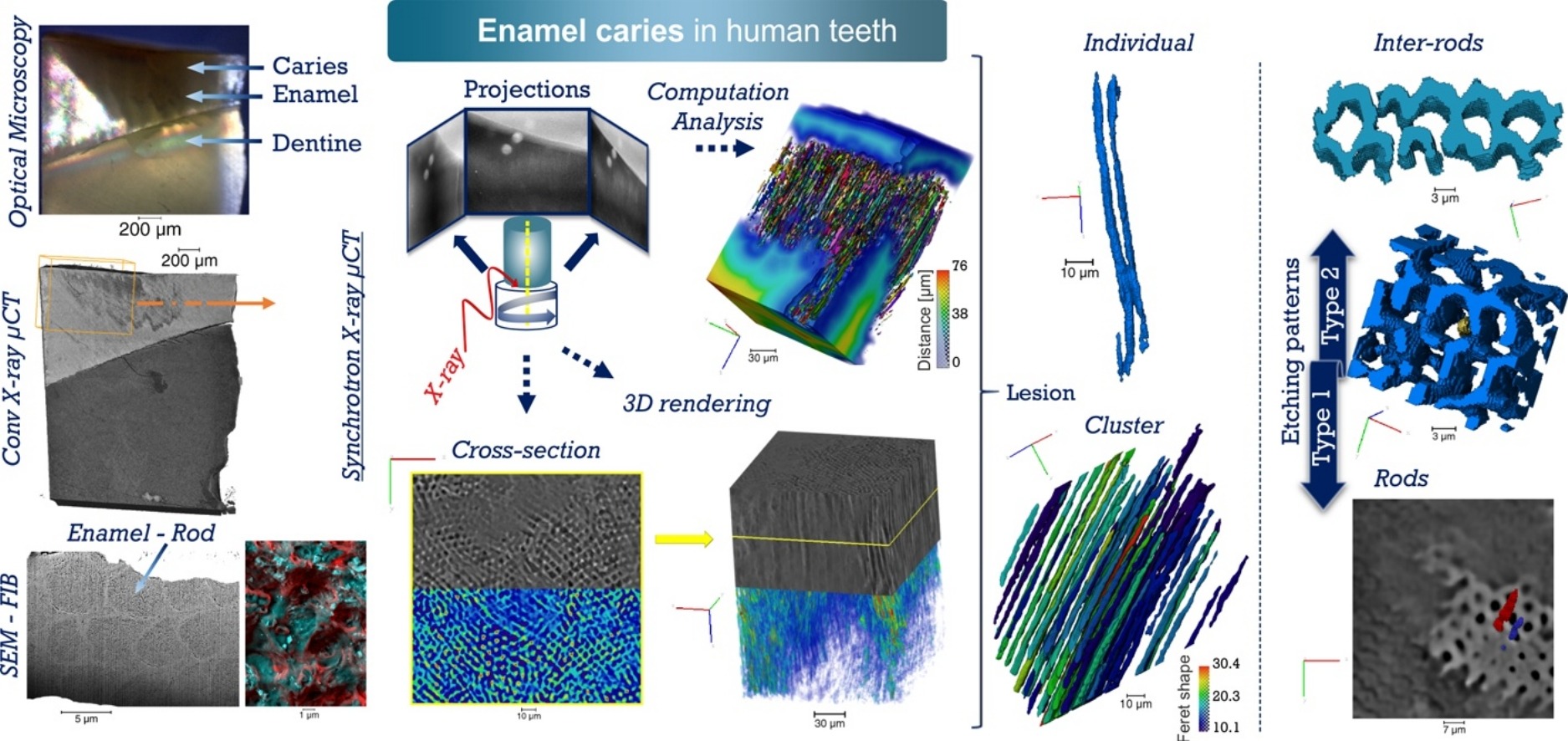
Unprecedented combination of resolution, field of view and contrast for the analysis human enamel carious lesions was achieved. Synchrotron X-ray micro-computed tomography revealed sub-micron details of enamel rod and inter-rod regions inaccessible by laboratory tomography. Successful segmentation and labelling allowed the extraction of enamel etching patterns and statistics. Correlation was obtained between synchrotron X-ray micro-tomography and FIB-SEM cross-sec... Read more
Cyril Besnard, Robert A. Harper, Thomas E. J. Moxham, Jonathan D. James, Malte Storm, Enrico Salvati, Gabriel Landini, Richard M. Shelton, Alexander M.Korsunsky
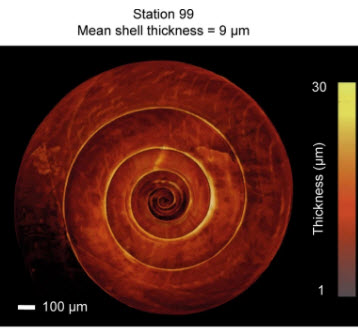
Pteropods make thinner shells in the upwelling region of the California Current Ecosystem
Shelled pteropods are widely regarded as bioindicators for ocean acidification, because their fragile aragonite shells are susceptible to increasing ocean acidity. While short-term incubations have demonstrated that pteropod calcification is negatively impacted by ocean acidification, we know little about net calcification in response to varying ocean conditions in natural populations. Here, we examine in situ calcification of Limacina helicina pteropods collected from the California... Read more
Lisette Mekkes, Willem Renema, Nina Bednaršek, Simone R. Alin, Richard A. Feely, Jef Huisman, Peter Roessingh & Katja T. C. A. Peijnenburg
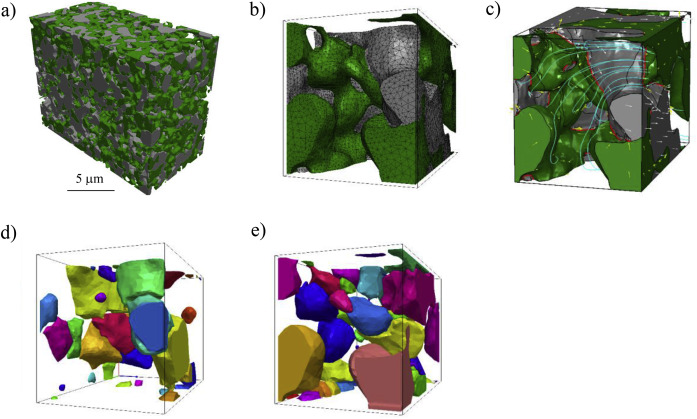
The electrode microstructural properties significantly influence the efficiency and durability of many electrochemical devices including solid oxide fuel cells. Despite the possibility of simulating the electrochemical phenomena within real three-dimensional microstructures, the potential of such 3D microstructural information has not yet been fully exploited. We introduce here a completely new methodology for the advanced characterization of inhomogeneous current distribution base... Read more
A.Bertei, V.Yufit, F.Tariq, N.P.Brandon
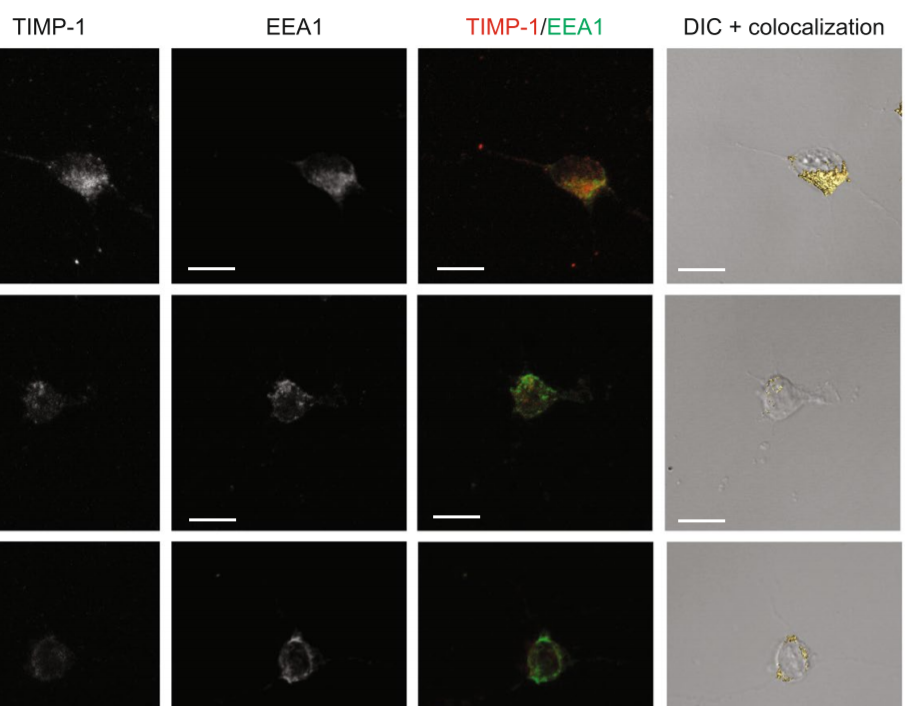
The tissue inhibitor of metalloproteinases-1 (TIMP-1) exerts inhibitory activity against matrix metalloproteinases and cytokine-like effects. We previously showed that TIMP-1 reduces neurite outgrowth in mouse cortical neurons and that this cytokine-like effect depends on TIMP-1 endocytosis mediated by the low-density lipoprotein receptor-related protein-1 (LRP-1). To gain insight into the interaction between TIMP-1 and LRP-1, we considered conformational changes that occur when a ligand bind... Read more
Laurie Verzeaux, Nicolas Belloy, Jessica Thevenard-Devy, Jérôme Devy, Géraldine Ferracci, Laurent Martiny, Stéphane Dedieu, Manuel Dauchez, Hervé Emonard, Nicolas Etique & Emmanuelle Devarenne-Charpentier
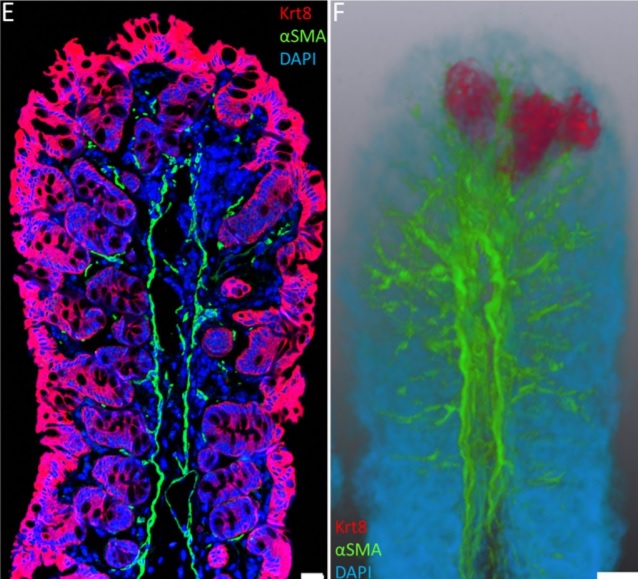
Immunofluorescence tomography is a high-resolution 3-D reconstruction method based on methacrylate embedding and serial-sectioning, where 2-D images of immuno-stained serial-sections are computationally aligned into image stacks, and the 3-D volume rendered. Butyl-Methyl Methacrylate (BMMA) plastic was adopted as it preserves excellent tissue morphology and can be de-plasticized easily using an organic solvent, which enables immuno-staining of serial-sections without antibody penetration issu... Read more
Parfitt, Geraint J
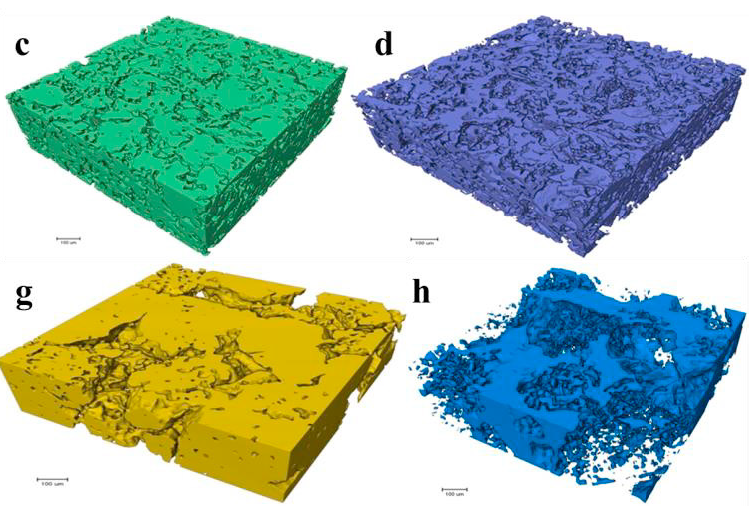
The porous transport layer (PTL) is a vital component of the polymer electrolyte membrane water electrolyser (PEMWE) as it is both a conduit for current distribution and mass transport. This study aims to examine the influence of the microstructure of the PTL on the performance of a PEMWE by the combination of ex-situ and in-situ techniques. Two PTLs with distinctly different mean pore diameter were characterized to determine key properties such as surface morphology, porosity, pore size dist... Read more
Jude O Majasan, Francesco Iacoviello, Paul R Shearing, Dan JL Brett
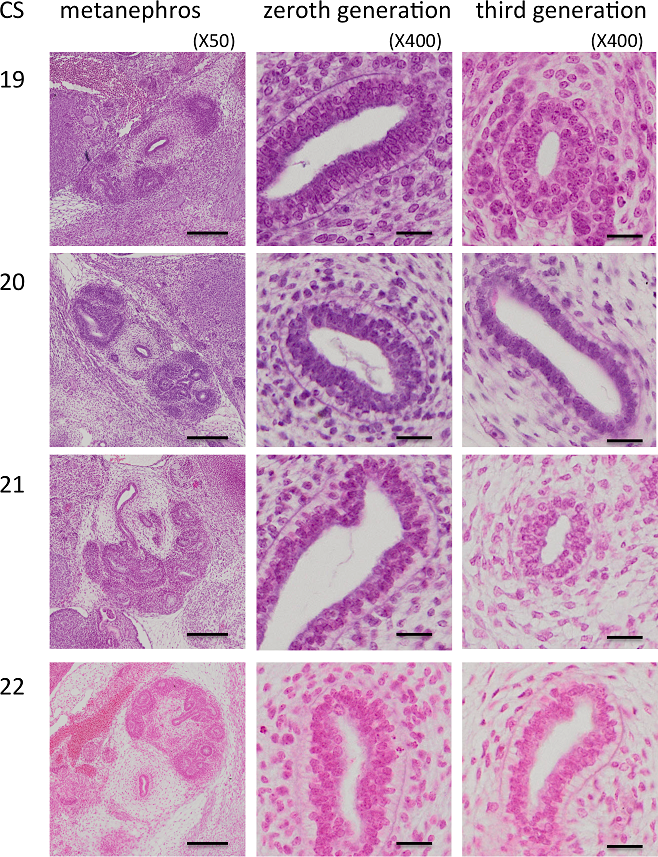
Branching morphogenesis of the urinary collecting system in the human embryonic metanephros
An elaborate system of ducts collects urine from all nephrons, and this structure is known as the urinary collecting system (UCS). This study focused on how the UCS is formed during human embryogenesis. Fifty human embryos between the Carnegie stage (CS) 14 and CS23 were selected from the Kyoto Collection at the Congenital Anomaly Research Center of Kyoto University, Japan. Metanephroses, including the UCS, were segmented on serial digital virtual histological sections. Three-dimensional imag... Read more
Hana Ishiyama, Aoi Ishikawa, Haruka Kitazawa, Sena Fujii, Jun Matsubayashi, Shigehito Yamada, Tetsuya Takakuwa
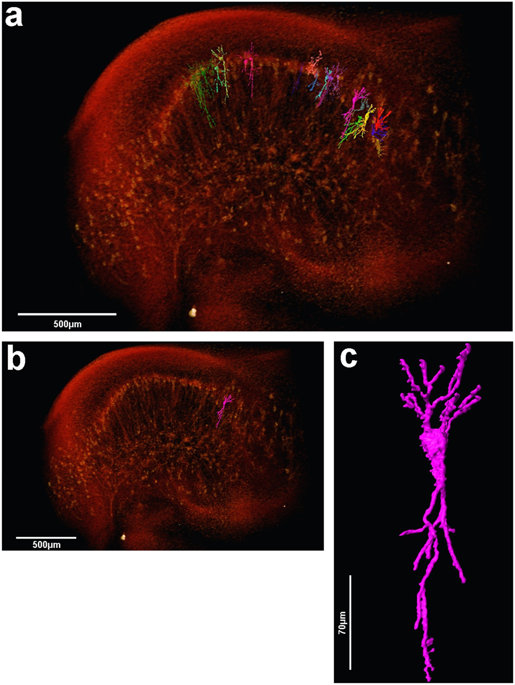
The assessment of neuronal number, spatial organization and connectivity is fundamental for a complete understanding of brain function. However, the evaluation of the three-dimensional (3D) brain cytoarchitecture at cellular resolution persists as a great challenge in the field of neuroscience. In this context, X-ray microtomography has shown to be a valuable non-destructive tool for imaging a broad range of samples, from dense materials to soft biological specimens, arisen as a new method fo... Read more
Matheus de Castro Fonseca, Bruno Henrique Silva Araujo, Carlos Sato Baraldi Dias, Nathaly Lopes Archilha, Dionísio Pedro Amorim Neto, Esper Cavalheiro, Harry Westfahl Jr, Antônio José Roque da Silva, Kleber Gomes Franchini